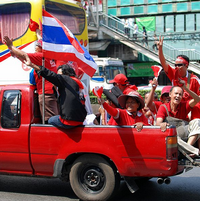BANGKOK -- Red Shirt anti-government protesters have conditionally accepted Prime Minister Abhisit Vejjajiva's roadmap for national reconciliation in a move that is expected to end the rallies that have paralyzed parts of the capital for months.
Opinions are mixed over whether the plan can bring lasting peace to a country whose unity has become increasingly fractured along lines of wealth, development and the urban/rural divide. But many analysts believe the proposed dissolution of Parliament in the second half of September followed by a general election on Nov. 14 will see the Red-Shirt United Front for Democracy against Dictatorship (UDD) bring an end to its protests, which have lasted for more than two months now.
The UDD, made up mostly of supporters of fugitive former Premier Thaksin Shinawatra from the country's north and northeast, had demanded that Abhisit immediately dissolve the house and call elections. Backed by Thaksin, a billionaire telecom tycoon, the UDD has in recent months framed its struggle as a class war between the Red Shirt phrai (serfs) and Bangkok's amat (bureaucratic elite).

